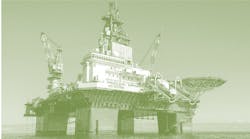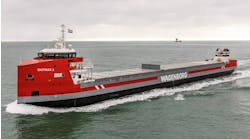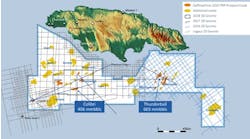Fred Akanni
Lagos
ANGOLA: Major action in deepwater
Amoco and British Petroleum are rumored to be the top favorites in the bidding for Angola's ultra-deep offshore Block 31. The bidding closed on May 29. Other operators competing for the lease include Elf, Exxon, and Norsk Hydro. The bidding exercise for Angola's hotly contested ultra-deepwater corridor (water depth: 1,500-2,500 meters) opened on April 1.Block 31 is located directly east, and adjacent to Exxon's Block 15, where two discovery wells - Kissanje-1 and Hungo-1, have been reported. Kissanje-1 tested cumulative 9,200 b/d of oil of between 26! and 36! API oil in two intervals. Hungo-1 encountered a 175 meter gross oil column in undisclosed intervals. Both are in Lower Miocene sands. Elf is speculated to be closest to clinching the award for Block 32, due south of Block 31, and Exxon is regarded as set for winning Block 33.
Meanwhile, in the nearshore deepwater, Agip has just won the award of Block 25, in the deep south Kwanza Basin. The signature bonus was $85 million. The Italian multinational is reportedly awaiting approval from partners Mobil, Norsk Hydro, and Sonangol. Exxon reportedly has been awarded Block 24 for a signature bonus of $79 million. The partners are BP and Sonangol.
Amoco reportedly has spudded Ouro Preta-1, the first of four wells proposed for 1998/99 in Block 18. The water depth is 228 metres. It will be Amoco's first well in deepwater Angola.
Texaco has received approval to commence operations in the deepwater Block 22 offshore Kwanza Basin. The size of the lease is 5,180 sq km and it is located in the deep south. The American company paid a signature bonus of $16.2 million, and is committed to a work program of three wells, 1,000 km of 2D seismic, as well as 1,000 sq km of 3D seismic. The remaining partners had not been named.
NIGERIA: BP, Statoil, and Allied end alliance
The five-year partnership between the BP/Statoil alliance and the indigenous Nigerian company Allied Petroleum in the deepwater lease OPL 210 offshore Niger Delta, seems to have come to an end. Allied is reported to be shopping for new partners for the lease after BP/Statoil finally decided to pull out with their 40% last April. On behalf of the alliance, Statoil funded and essentially operated the lease, located between 200 meters and 1,000 meters of water in the western Niger Delta.After extensive 2D and 3D seismic coverage, two wells have been drilled in the last three years, one of which indicates a marginal pool of oil in ponded slope sediments with the other well coming up dry. Statoil may have spent up to $70 million on the lease, including the sign-on fees paid to Allied Petroleum, a subsidiary of Camac Corporation of Houston, which also owns Tuskar Oil of Dublin.
Conoco may confirm Niger Delta potential
Conoco reportedly is excited about their findings in Chota-1 well in OPL 220 in the deep offshore Niger Delta Basin off Nigeria. Information is tight, but a local newspaper reported the company may have encountered oil in two pay zones above the primary objective (circa 10,500 ft MD). Chota-1 is Conoco's second well in the deepwater Nigeria. If the report of an oil find is true, the encounter would have helped further shatter the notion that the eastern part of the deep offshore Niger Delta is essentially a gas-prone regime with some oil shows.Ashland sells out of Nigeria
Ashland Oil announced in May that it has sold all of its oil-based interests in Nigeria to a subsidiary of the Swiss-owned Addax Oryx Group for an undisclosed amount. Three out of Ashland's four leases in Nigeria are located offshore. Before the decision to pull out, the company was planning to bring Okwori-South Field, in offshore OPL 90, onstream at 20,000 b/d of oil."In Ashland's view, the transaction also resolved and concludes previous disputes between Ashland, the government of Nigeria, and applicable governmental agencies," said a statement issued by Ashland (Ashland, Kentucky, US).
The sale effectively takes Ashland out of the exploration and production sector of the oil business, said Stan Lampe, Ashland spokesman. Ashland maintains a 38% stake in the Ashland Marathon joint venture, which owns and operates seven oil refineries, retail gasoline stations, and 10,000 miles of pipelines.
The Nigerian sale is the latest of a major restructuring of Ashland in the past two years which has turned it primarily into a chemicals company. Ashland said in June of 1997 it had transferred its Nigerian interests to a private French company, Persenco Investments. However, the Nigerian oil ministry revoked Ashland's operating license, saying the company had not been cleared to make the transfer.
Subsequently, Ashland said it was talking to French oil major Total about selling the assets, and oil industry sources said Texaco also had been in talks. Ashland's interest includes crude oil equity shares in about six offshore fields with 17,000 b/d production and an offshore floating terminal.
Nigeria, Cameroon hostilities increase
The prolific Southeast Offshore Niger Delta, where Mobil produces a third of Nigeria's crude output, and the entire supply from neighboring Equitorial Guinea, is the site of perennial, low intensity war. Nigeria's army said last month (May 6) that neighboring Cameroon was trying to provoke war over the disputed Bakassi Peninsula, which lies northeast of Mobil's acreages. Nigeria's Defence headquarters spokesman, Colonel Godwin Ugbo, said in a statement that Cameroon had moved 2,000 troops to the border and last April fired rockets at Nigeria, destroying houses and wounding fishermen and traders."Nigeria is aware of the grand strategy and ploy of Cameroon in drawing our armed forces into war so as to impress on the international community that Nigeria is the belligerent," the statement said.
Nigeria and Cameroon have clashed sporadically over the swampy peninsula in the Gulf of Guinea since 1994. Though inhabited by impoverished fishing villages, it is thought to hold significant reserves of crude oil. Early in March, the International Court of Justice (ICJ) at The Hague held hearings in a case filed in 1994 by Cameroon against Nigeria over the peninsula. Nigeria is asking the ICJ to throw out the case. The court said it would take about four months to rule on Nigeria's objections.
Copyright 1998 Oil & Gas Journal. All Rights Reserved.


